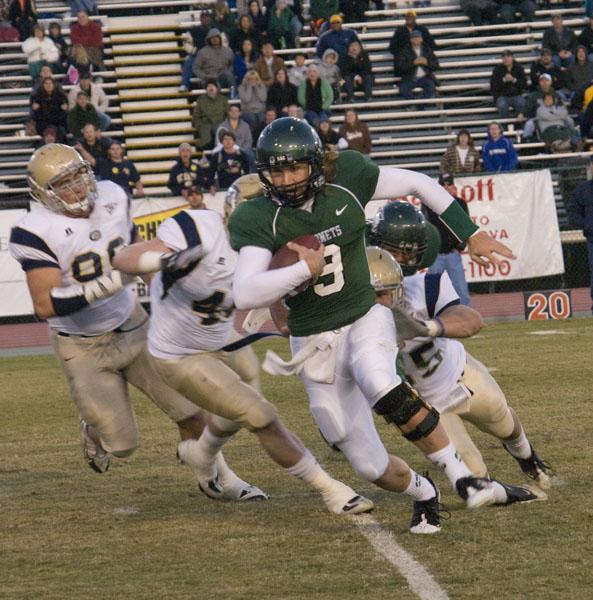Quarterback injuries have serious impact

McLeod against UCD:McLeod Bethel-Thompson (9) will take over for the injured Jason Smith during the 2010 season.:File Photo
February 23, 2010
Quarterbacks are seen as the golden boys of football. They are essentially born with a silver spoon in their mouths. It is the position with the most rules protecting their well-being on the field.
But there is a reason why leagues have started to crack down on hits to the quarterback.
“Quarterbacks are pretty much sitting ducks,” said director of athletic training Steve DeHart. “They can be seen as the pretty boys, but they take as much of a pounding, if not more, than anybody because they get everybody’s full hit. As a quarterback, you have people winding up who want to kill you.”
The Sacramento State football team has learned just what a detriment the constant pounding on the quarterback can be to a team. Jason Smith, the starting quarterback for much of the past three seasons, has been forced to take a medical retirement due to his small stature, which just can’t take the constant beating he got over the past few season. Smith’s smaller stature (6 feet, 195 pounds) is not able to withstand as many hits as his replacement, junior McLeod Bethel-Thompson (6 feet, 3 inches tall; 235 pounds). Bethel-Thompson has a more prototypical stature to withstand the rigors of the quarterback position.
Quarterbacks deal with many ailments which could have a negative impact on their on-field performance.
“Obviously you see all the throwing type of injuries,” Dehart said. “When they get hit with their arm up, there is potential for labrum damage. They get hit by big guys who throw them down on their shoulders and you get shoulder separations with some regularity.”
Two other areas where injuries to quarterbacks tend to occur are the ribs and the lower legs.
“They can get hit in the ribs, they have a lot of padding in there, but there is always the chance for bruised ribs,” DeHart said. “Sometimes you have linemen and linebackers diving at their knees so there is a lot of knee and ankle injuries.”
But as DeHart pointed out, in virtually every play there is a chance for injury for the quarterback position.
“They get the run of the gamut,” he said. “They also have the concussion issue. They got people teeing off on them, especially from the blind side.”
Conditioning and age play a major role in injury prevention.
“We can take a pounding when we are young, but every hit builds on with the next one,” DeHart said. “Once we get fatigued, we don’t protect ourselves nearly as well as we can. And when they do have injuries, it’s doing all the rehab”
Sports injuries have become a large industry and the need for physical therapists who can assess and rehabilitate sports related injuries has made it one of the fastest growing fields in the country. According to an article on Yahoo!, physical therapist assistant is the fourth-fastest growing career in the country.
Kin Ho, a physical therapist at First Physical and Sports Therapy in Burbank, Calif., may be new to the physical therapy industry, but she has a fresh knowledge about rehabilitation, as she recently got out of school.
“I like to assess their pain first and work on their range of motion before trying to strengthen their muscles,” Ho said.
While prevention is the first step in her field, she would be the first to admit that injuries happen no matter the amount of energy put into prevention.
“Some things we just can’t control,” Ho said.
But there are always things that can be done to prevent some minor injuries.
“A lot of strengthening of the surrounding muscles,” Ho said. “Strengthening the surrounding muscles can protect the joints.”
DeHart said other than a strong body, the quarterback must rely on his teammates for protection.
“Have a good offensive line,” DeHart said. “What can you do to avoid it? Not get hit, but that’s not gonna happen. Get rid of the ball before you get hit, get to the ground a little earlier.”
Ross Coleman can be reached at [email protected]











































































































































